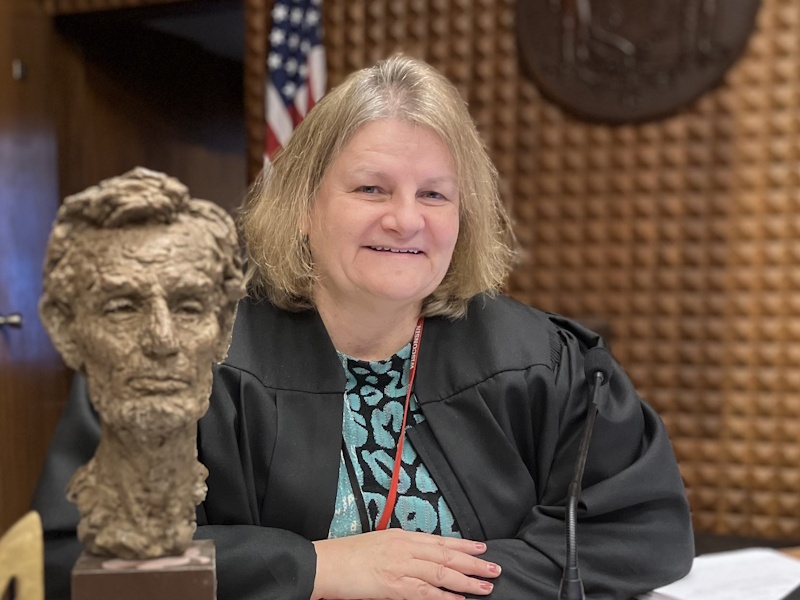What Will Jurors Hear At The Dugan Trial?
Key experts could buttress Judge Dugan's defense -- if court allows them.
The case against Hannah Dugan — the Milwaukee County judge who’s accused of helping a man evade immigration enforcement — is set to for trial next month.
In the meantime, attorneys for both sides are haggling over key details, including what evidence jurors should be allowed to hear and see, and which experts should be allowed to testify during the trial overseen by U.S. District Judge Lynn Adelman.
Those pretrial motions — and Adelman’s response — offer clues about what arguments will be presented during the high-profile trial set to begin on Dec. 15.
What is Judge Hannah Dugan charged with?
Dugan’s legal troubles started on April 18, when federal agents showed up at the Milwaukee County courthouse with a warrant. The agents said a man on Dugan’s criminal court docket was in the country illegally, and they planned to take him into custody.
At the time, Dugan asked to see a judicial warrant, which is a warrant signed by a judge, according to court filings. The agents told Dugan they didn’t have that; instead, they had an administrative warrant signed by an official with the U.S. Department of Homeland Security.
After some of the agents left Dugan’s courtroom to speak with Milwaukee County’s chief judge, Dugan led the man, whose name is Eduardo Flores-Ruiz, through a side door of her court room and told him and his attorney that his court appearance would be rescheduled to take place over Zoom, court documents say.
Dugan now faces two federal charges — obstructing or impeding a proceeding, a felony, and concealing an individual to prevent his discovery and arrest, a misdemeanor.
Did Dugan ‘impede’ a proceeding?
In recent court filings, attorneys for both sides have signaled that they plan to argue over what exactly those charges mean. That’s likely to include disputes about the definitions of specific words — like what it means to “conceal” someone and whether Dugan acted “corruptly.”
Among other arguments, Dugan’s attorneys have indicated they’ll try to knock down the charge of impeding a federal proceeding by arguing that no “proceeding” was ongoing at the time when agents showed up to arrest Flores-Ruiz.
To do so, Dugan’s team wants to bring in expert testimony from Theodore Chadwick, a Milwaukee-based immigration attorney with 15 years of experience.
According to court documents, Flores-Ruiz was first deported back in 2013. He later re-entered the U.S., and in 2025, Immigrations and Customs Enforcement issued a type of an administrative warrant known as an I-200 warrant against him.
That warrant, which agents brought to the courthouse on April 18, said that Flores-Ruiz “lacked immigration status or notwithstanding such status is removable under U.S. immigration law,” but — according to Dugan’s attorneys —the warrant did not establish that deportation proceedings were currently pending against him.
After agents apprehended Flores-Ruiz on April 18, ICE issued another warrant, saying that Flores-Ruiz had been subject to a final deportation order dating back to 2013. Nonetheless, Dugan’s attorneys argue that’s not enough to show that a federal proceeding was “pending” at the time when agents arrived at the courthouse.
Federal prosecutors have disputed those arguments. They’ve asked Adelman to block Chadwick’s testimony.
“Attorney Chadwick’s opinion would be based on his interpretation of immigration statutes and regulations,” lawyers for the federal government wrote. “He would testify on the scope and meaning of ‘removal proceedings’ as an impermissible way to bootstrap the defendant’s narrow construction of ‘pending proceedings.’”
In an order Tuesday, Adelman declined to decide whether those arguments —and Chadwick’s testimony — should be allowed. Instead, Adelman said that matter would be discussed further during a pretrial hearing on Wednesday.
Those issues may not be clear cut, said Kevin Johnson, a professor specializing in immigration law at the University of California-Davis.
“Congress probably didn’t think about this particular instance in passing the law, and so the parties are going to argue about the meaning of the text of the statute,” Johnson said. “It’s a challenging question.”
Agents eventually arrested Flores-Ruiz. Will that matter to Dugan’s case?
After Flores-Ruiz left Dugan’s courtroom through a side door, he tried to run away, according to court documents. But federal agents did catch up to him after chasing him on foot. He was arrested outside the courthouse.
The federal government has tried to block Dugan’s team from using that fact to argue that Dugan cannot be convicted of obstructing Flores-Ruiz’s arrest.
“In other words, the defense may attempt to argue ‘no harm; no foul,’” federal prosecutors wrote. “Such comment should be disallowed because neither of the statutes charged in the indictment requires that the defendant succeed to be convicted.”
In his ruling ahead of Wednesday’s pretrial, Adelman did not block those arguments, but left open the possibility that he would do so in the future as part of instructions to jurors that have not yet been finalized.
“Defendant will be permitted to present evidence and argument that she did not endeavor to obstruct the arrest of (Flores-Ruiz),” the federal judge wrote on Tuesday.
Law professor: Prosecution intended to send a ‘message’ to judges
Johnson, the law professor at UC-Davis, believes there is significance to the fact that Flores-Ruiz was arrested in the end.
“Any injury or damage caused by the judge’s alleged misconduct was relatively minimal,” he said. “It delayed — it didn’t prevent — an arrest. And so I think that that leads me back to the idea that the government really isn’t injured that much here. They’re just trying to send a message.”
Flores-Ruiz’s domestic abuse case in Milwaukee County was closed earlier this month after he pleaded no contest to a charge of battery. He was deported in mid-November, according to DHS.
Johnson noted that it’s unusual for a judge to be facing criminal charges. He said prosecutors may struggle to prove certain elements of the charges against Dugan — like that she “concealed” someone or acted “corruptly.”
“It’s hard to make the argument that the judge was acting in a corrupt way. This didn’t involve bribery or some exchange of services,” he said. “Concealing, you know, that’s usually a physical act of trying to hide somebody, and that’s harder to square with the facts of this case. It leads me to believe this is a stretch of a prosecution which is consistent with the idea that it’s designed to send a signal (to other state-level judges).”
He added, “You would think that we’d want the U.S. government to be focusing on violent crimes and serious crimes of corruption, not on political agendas designed to facilitate a mass deportation campaign.”
Throughout the pre-trial proceedings, Dugan’s attorneys have argued that the federal government overreached. They’ve contended that Dugan was targeted just for doing her job and for exercising her authority to run her own courtroom. In contrast, the U.S. Department of Justice has maintained that Dugan broke federal laws and said that no one — not even a judge — should be above those laws.
Since President Donald Trump’s second term began, there have been multiple instances of immigration agents showing up to the Milwaukee County courthouse. The practice has drawn condemnation from local leaders, who worry that ICE’s presence will discourage people from showing up to their court dates, and make immigrants fearful about coming forward as victims of or witnesses to crimes.
Federal officials have defended the courthouse arrests, noting that it’s easier to find people when they’re scheduled for a court date. They’ve also argued that arrests are safer after the people involved have gone through courthouse metal detectors.
Despite the objections of prosecutors, Adelman has said that jurors will be allowed to hear about other immigration arrests at the Milwaukee County courthouse.
“I agree with defense that such evidence may be relevant to defendant’s mental state,” Adelman wrote in Tuesday’s order.
What happens next in the case?
Attorneys will be back in court Wednesday morning for the case’s final pretrial hearing.
After that, jury selection is scheduled for two days, beginning on Dec. 11.
Brad Schimel, a newly appointed U.S. Attorney for the region that includes Milwaukee, told the Associated Press and other media outlets that federal prosecutors have approached Dugan’s legal team about a potential plea deal. Schimel also said that Dugan has not accepted such a deal and continues to maintain her innocence.
What will jurors hear during the Dugan trial? Court filings offer clues. was originally published by Wisconsin Public Radio.
If you think stories like this are important, become a member of Urban Milwaukee and help support real, independent journalism. Plus you get some cool added benefits.
More about the Courthouse ICE Arrests
- Judge Hannah Dugan Resigns - Sarah Lehr - Jan 4th, 2026
- Hannah Dugan Seeks New Trial - Graham Kilmer - Dec 23rd, 2025
- Op Ed: Making Sense of Judge Dugan’s Conviction - Ruth Conniff - Dec 22nd, 2025
- After Dugan Verdict Comes Politics and Courthouse Uncertainty - Graham Kilmer - Dec 21st, 2025
- Wisconsin Republicans Threaten to Impeach Judge Hannah Dugan - Anya van Wagtendonk - Dec 20th, 2025
- Forward Latino Corrects Misinformation Presented During Judge Hannah Dugan Trial - Forward Latino - Dec 19th, 2025
- United States Thanks Jurors for Their Service and Urges Peaceful Response to Verdict - U.S. Department of Justice - Dec 19th, 2025
- Dugan Must Go - Wisconsin Assembly Speaker Robin Vos - Dec 19th, 2025
- A Dangerous Precedent - Press Release - Dec 19th, 2025
- Verdict Against Judge Dugan Threatens Due Process and Judicial Independence - Voces de la Frontera - Dec 19th, 2025
Read more about Courthouse ICE Arrests here






















This has gone too far.
ICE Agent’s did not have the the required Judicial Warrant
They only had an Administrative Warrant.
The former is signed by a Judge. The later is from Homeland Security
Jail Duggan.